- Home
- Vladimir Nabokov
Glory Page 10
Glory Read online
Page 10
In October he returned to England in a stinging mood of self-depreciation. Straight from the station he went to see the Zilanovs. The housemaid who opened the door was new, and this was unpleasant, making it seem he had come to a strange house. Sonia, dressed all in black, stood in the middle of the living room smoothing her temples, then proffered her hand, in a straight sharp gesture as was her wont. With amazement Martin realized that not once during the summer had he thought of her, not once had he written, but that nonetheless it would have been worth while to travel a long way, if only for the sake of that embarrassment that he now felt as he looked at her pale sullen face. “You probably have not heard of our grief,” said Sonia and in an oddly cross tone related that the week before, on the same day, they had received information that Nelly had died in childbirth in Brindisi, and her husband had been killed in the Crimea. “Ah, then he left Yudenich to join Wrangel,” said Martin lamely, and with exceptional clarity visualized that husband of Nelly’s whom he had seen but once, and Nelly herself who at the time had seemed to him dull and insipid, and now had gone and died in Brindisi. “Mother is in a terrible state,” said Sonia leafing through a book that lay abandoned on the sofa. “And father’s been traveling in secret to God knows what places, possibly as far as Kiev,” she added after a while and separating several pages with a thumb allowed them to mill rapidly. Martin seated himself in an armchair rubbing his hands. Sonia slapped the book closed and said raising her face: “Darwin has been perfect, simply perfect. He was a tremendous help to us. So touching, and not one wrong word. Are you staying for the night?” “Actually,” said Martin, “I could go up to Cambridge tonight. It would surely bother you to put me up, and so forth.” “No, what nonsense,” said Sonia and sighed. The sound of the dinner gong reached them from downstairs, and this clashed with the atmosphere of mourning that pervaded the house. Martin went to wash his hands. As he entered the lavatory he collided with Zilanov who did not make it a custom to lock the door. He glanced at Martin out of lusterless eyes while unhurriedly buttoning his fly. “Accept my deepest sympathy,” muttered Martin and stupidly clicked his heels. Zilanov lowered his lids in sign of gratitude and shook hands with Martin. The fact that all this occurred on the threshold of the lavatory underlined the absurdity of the handclasp and the ready-made words. Zilanov slowly walked off, his thighs twitching as if he were shaking down something between them. Martin’s nose, as its owner noticed in the mirror, was wrinkled in anguish. “After all I did have to say something,” he muttered through his teeth.
Dinner proceeded in silence if one discounted the old-fashioned slurp with which Zilanov ate his soup. Irina and her mother were at an out-of-town sanitarium, and Mrs. Zilanov did not come down, so that they dined just the three of them. The telephone rang, and Zilanov marched to his study chewing on the way. “I know you don’t like mutton,” Sonia said softly, and Martin silently smiled a slightly muted smile. “Iogolevich will drop in,” said Zilanov resuming his place at the table. “He has just returned from St. Petersburg. Pass me the mustard. He says he crossed the border wrapped in a shroud.” “Less conspicuous on snow,” said Martin a moment later to keep up the conversation, but no conversation ensued.
22
Aleksandr Naumovich Iogolevich turned out to be a fat bearded man in a knit gray waistcoat and shabby black suit, with dandruff on his shoulders. The side-ears of his black prunella boots stuck out, and the ankle ties of his underpants glimmered through his sagging socks. The way he completely ignored inanimate objects (such as the arm support of the chair which he mechanically kept tapping with his hand, or the thick book on which he sat down by mistake, then took out from under him without a smile, and put aside without glancing at it) pointed to a secret affinity with Zilanov. Nodding his large frizzly head, he only responded with a short clucking of his tongue to the news of his friend’s bereavement; then quickly passing the palm of his hand down his coarsely fashioned face, without any preliminaries, launched into his story. It was obvious that the only thing that filled his consciousness, the only thing that preoccupied and affected him, was Russia’s woe, and with trepidation Martin pictured to himself what would happen were he to interrupt Iogolevich’s stormy tense speech by telling the anecdote about the student and his girl cousin. Sonia sat at a distance, propping her elbows on her knees, and her face on her palms. Zilanov listened, one finger stretched along his nose, occasionally removing the finger to say: “Excuse me, Aleksandr Naumovich, but, for instance, when you mention—” and Iogolevich would stop for an instant, blink, then resume his tale, with a constant remarkable motion of his rough, ceaselessly changing features—his shaggy brows, the nostrils of his pear-shaped nose, the folds of his bearded cheeks—nor did his hands with black hair on the phalanges rest for one second: they lifted something, tossed it upward, seized it again, strewed it in every direction, and all the while, hotly, in a rolling delivery, he spoke of executions, of famine, of St. Petersburg turned into a desert, of the regime’s malice, stupidity and vulgarity. He left after midnight and suddenly turning around on the threshold asked how much kaloshi (rubbers) cost in London. After the door had closed, Zilanov remained standing, lost in thought, then went upstairs to his wife. The doorbell rang three minutes later: Iogolevich had come back; it turned out that he did not know the way to the tube station. Martin offered to take him there and while striding at Iogolevich’s side cast about in distress for a subject of conversation. “Remind your father,” said Iogolevich abruptly, “I quite forgot to tell him that Maksimov is impatient to receive the article on his impressions from visiting the Southern Volunteer Army. He will know what it’s about. Just tell him. Maksimov has written to your father before.” “Certainly,” answered Martin; was about to add something but checked himself.
He slowly returned to the house, imagining now Iogolevich crossing the border wrapped in a white sheet, then Zilanov with his briefcase at some demolished railroad station under the starry Ukrainian sky. All was silent in the house when he went up the stairs. He kept yawning while he undressed. He felt an odd, vague anguish. The lamp on the bedside table burned bright, the wide bed looked white and soft, his dressing gown of lustrous blue silk had been taken out of his bag by the maid and was slung invitingly over the armchair. He noticed with a shock of vexation that he had forgotten to bring up from the living room a book he had set his heart on there, and had been looking forward to reading in bed. He pulled on his dressing gown and walked down to the second floor. The book was a dilapidated volume of Chekhov’s stories. He found it—for some reason it was lying on the floor—and returned to his bedroom. But the heartache did not dissipate, although Martin was one of those people for whom a good book before sleep is something to look forward to all day. Such a person, upon happening to recall, amidst routine occupations, that on his bedside table a book is waiting for him, in perfect safety, feels a surge of inexpressible happiness. Martin began to read, choosing the story he knew, loved, could read through one hundred times in a row: “The Lady with the Little Dog.” Ah, how nicely she lost that lorgnette in the crowd on the pier in Yalta! And here, without any apparent reason, he realized what it was that disturbed him so. Only a year before, in this room, Nelly had slept, and now she was dead.
“What nonsense,” muttered Martin, and tried to resume his reading, but this proved impossible. He recalled those nights of long ago when he waited for the ghost of his father to make a scratching sound in a corner. Martin’s heart started to beat fast; the bed became hot and uncomfortable. He imagined how he himself would be dying some day, and felt as if the ceiling were coming down on him slowly and inexorably. Something began to drum rapidly in the darker part of the room, and his heart missed a beat. But it was merely water that had been spilled on the washstand and was now dripping onto the linoleum. Yet how strange: if ghosts exist, then all is well for it proves that souls can move after death—why then is it so frightening? “How shall I be dying myself?” thought Martin and began to pass mentally in review
several varieties of death. He saw himself placed against a wall, standing there with as much air in his lungs as he could inhale, waiting for the volley of rifle shots and recollecting with wild despair this present minute, this bright room, the soft night, unconcern, safety. Then there were illnesses, dreadful illnesses rending one’s entrails. Or it might be a railway accident. Or, simply, the serene slowing down of old age, death in one’s sleep. Or else, a dark wood and pursuit. “Nonsense,” thought Martin. “I have plenty of time in reserve. Besides, every year represents a whole epoch. Why worry? Yet perhaps Nelly is here, and is seeing me now? Perhaps—now, this instant—she will give me a sign?” He looked at his watch, it was close to two. The tension was becoming unbearable. That silence seemed to be waiting: the distant hoot of an automobile horn would have been rapture. The level of silence kept rising, and all at once poured over the brim: someone on tiptoe was coming barefoot along the passage.
“Are you asleep?” came the whispered question through the door, and for an instant a constriction in his throat prevented Martin from replying. She slipped in, she softly shifted from tiptoe to heel. She wore yellow pajamas, her black hair was rumpled. Thus she remained standing for a moment or two blinking through matted lashes. Martin, sitting up in bed, grinned foolishly. “Sleep is utterly out of the question,” said Sonia in an odd voice. “I’m jumpy. I’m scared. And on top of it, those horrors he talked about!” “Why are you barefoot, Sonia? Want my slippers?” She shook her head, pouting pensively, then tossed her hair and cast a vague glance at Martin’s bed. “Allez hop,” said Martin, tapping the blanket at the foot of the bed. She climbed onto the bed, first kneeled upon it, then moved about slowly, and finally curled up on the blanket in the corner formed by footboard and wall. Martin pulled out the pillow from under his head to place it behind her back. “Spasibo (thanks),” she said quite soundlessly: the outline of the word could only be guessed from the movement of her plump pale lips. “Are you comfortable?” asked Martin nervously, pulling up his knees so as not to be in her way, but presently he bent forward again, and taking his dressing gown from the adjacent chair, covered her bare feet with it. “Give me a cigarette,” she asked after a minute of silence. A waft of delicate warmth emanated from her; a thin chainlet of gold surrounded her adorable neck. She inhaled, slitting her eyes, and handed the cigarette to Martin. “Too strong,” she said sadly. “What did you do this summer?” inquired Martin struggling to subdue a dark something that was quite mad and unthinkable and that even induced a febrile chill. “Nothing in particular. We went to Brighton.” She sighed and added “I flew in a hydroplane.” “And I very nearly got killed,” said Martin. “Yes, yes, very nearly. High up in the mountains. Rock climbing. Lost my hold. Saved by a miracle.” Sonia smiled dimly and said “You know, Martin, she always maintained that the most important thing in life was always to do one’s duty and think of nothing else. It’s a very deep thought, isn’t it?” “Yes, possibly,” Martin replied, shoving the unfinished cigarette into the ashtray with an uncertain hand. “Possibly. But sometimes a bit boring.” “Oh, no, not at all——You don’t understand, she didn’t mean work or job, but a kind of—well, the kind of thing which has an inner importance.” She paused, and Martin saw her shiver in her light little pajamas. “You are cold,” he said. “Yes, I think I am. And that was the duty to be performed, but some—I, for instance—do not have any such thing inside.” “Sonia,” said Martin, “maybe you’d like——?” He turned back a corner of the blanket, and she rose to a kneeling position and moved slowly in his direction. “And it seems to me,” she continued as she crawled under the bedclothes, which Martin, hearing nothing of what she was saying, awkwardly pulled over her and himself, “It seems to me that lots of people do not know this, and because they don’t——” With a deep intake of breath Martin embraced her and attached his lips to her cheek. Sonia seized him by the wrist, and forthwith rolled out of the bed. “Good God,” she said, “Good God!” Her dark eyes glistened with tears, and within an instant her whole face was wet, with bright long streaks creeping down her cheeks. “Oh please, please don’t—I merely—oh I don’t know, oh Sonia——” Martin kept muttering, not daring to touch her, losing his head at the thought that she might start screaming and arouse the entire household. “How couldn’t you see,” she said plaintively, “how couldn’t you see that this was the way I used to come to Nelly, and we talked and talked till dawn.” She turned away and left the room crying. Martin sat in a chaos of bedclothes with a helplessly ingratiating expression on his face. She closed the door behind her, but reopened it, and introduced her head: “Idiot,” she said in a perfectly calm, businesslike manner, whereupon the patter of her bare feet receded along the passage.
For some time Martin kept staring at the white door. Then he put out the light and attempted to sleep. This appeared to be hopeless. He reflected that at daybreak he must dress, get packed, and noiselessly leave the house to go straight to the station; unfortunately he fell asleep amidst those meditations and woke up only at a quarter past nine. “Maybe it was all a dream?” he said to himself with some hope, but at once shook his head and with a pang of excruciating shame wondered how he would meet Sonia again after this. He had an unfortunate morning: when he rushed in to take his bath, there, at the washstand, was Zilanov, his short legs in black trousers set wide apart, his torso in a thick flannel undershirt bent forward, dousing his face over the basin, rubbing cheeks and forehead until the skin squeaked, snorting under the spouting faucet, pressing each nostril in turn, fiercely relieving his nose, and expectorating. “Come in, come in, I’m through,” he exclaimed and, blinded by water, dripping, and holding his arms in the semblance of short wings, he dashed to his bedroom where he preferred to keep his towel.
Then, a little later, as Martin was on his way downstairs to the dining room to drink his cup of hemlock, he ran into Mrs. Zilanov: her face, livid and swollen, looked awful, and he felt dreadfully embarrassed, not daring to utter stock words of compassion, but not knowing any others. In acknowledgment of his silence she put her arms about him, kissed him on the forehead—and, with a hopeless wave of her hand, walked away, to the bottom of the corridor, where her husband mentioned to her something about a passport with a totally unexpected tender break in his voice of which he had seemed wholly incapable. Sonia met Martin in the dining room, and the first thing she said to him was, “I forgive you, because you are Swiss, and ‘cretin’ is a Swiss word, jot that down.” Martin had planned to explain that he had had no wicked intentions, which on the whole was the truth, that all he had wanted to do was to lie close to her and keep kissing her cheek—but Sonia looked so cross and cheerless in her black dress that he thought it best to say nothing. “Papa is leaving today for Brindisi,” she said, “thank goodness they did give him a visa at last.” She contemplated with disapproval the poorly contained greed with which Martin, who always felt ravenous in the morning, was devouring his fried eggs. Martin told himself there was no point in hanging around, the day promised to be topsy-turvy, the seeing-off ritual and all the rest. “Darwin has telephoned,” added Sonia.
23
Darwin made his appearance with comedy precision—immediately in the wake of Sonia’s remark, as if he had been waiting in the wings. The seaside sun had given him a roast-beef complexion and he wore a marvelous pale-gray suit. Sonia’s greeting struck Martin as a little too languorous. Martin himself was grasped, hit on the shoulder, hit in the ribs, and asked repeatedly why he had not phoned. Indeed, the usually indolent Darwin displayed that day unprecedented energy. At Liverpool Street station he took a stranger’s trunk from the porter to carry it balanced on his nape. In the Pullman, midway between London and Cambridge, after a glance at his wristwatch, he called the conductor, handed him a banknote, and solemnly pulled the emergency cord. The train groaned agonizingly and came to a stop, while Darwin smugly explained to everybody at large that he was born exactly twenty-four years ago. A day later, one of the livelier newspapers had
a note about it conspicuously headlined: “YOUNG AUTHOR STOPS TRAIN ON BIRTHDAY.” Meanwhile Darwin had been summoned by his tutor whom he was now trying to hypnotize with a detailed report on the leech commerce, what were the better sorts and how they were bred.
The same damp greeted Martin in his bedroom; there was the same interchime of towers, and in the same old way Vadim would tumble in with a sample of the same rhymed Russian alphabet consisting of couplets, the first verse containing a didactic item of general interest (“Armenians like to fish and hunt” or “Balloons are never made of brick”) and the second, equally didactic, beginning with the same letter, but quite unrelated to the first line and considerably more improper.
Archibald Moon, however, although in a sense the same, seemed to be different: Martin could not manage to recapture the old enchantment. Moon told him that during the summer he had completed as many as sixteen new pages of his History of Russia, fully sixteen pages; he explained that he was able to accomplish so much because he devoted to work every hour of the long summer day, and as he said it he made with his fingers a gesture representing the ripple and plasticity of every phrase that he had nursed to life; in that gesture Martin seemed to discern something extremely depraved, and to listen to Moon’s rich speech was like chewing thick elastic Turkish Delight powdered with confectioner’s sugar. For the first time Martin felt personally offended by Moon’s treating Russia as an inanimate article of luxury. When he confided this to Darwin, Darwin laughed and nodded, and said that Moon was like that because of his addiction to uranism. This called for closer attention, and after one occasion when Moon without any excuse stroked Martin’s hair with trembling fingers, Martin stopped dropping in, and would noiselessly climb out of his window and down a rainpipe into the lane whenever there came that yearnful, lonesome knock on the door of his room. He nevertheless continued to attend Moon’s lectures, but now in studying Russian literature he endeavored to efface from his hearing Moon’s intonations, which kept pursuing him, especially in the rhythm of verse. He ended by switching to another teacher, grand old Professor Stephens, whose interpretation of Pushkin and Tolstoy was as honest as it was ponderous, and who spoke Russian in gasps and barks with the frequent addition of Serbian and Polish. Still it took time to shake off Archibald Moon for good. He would recall with involuntary admiration the artistry of Moon’s discourse, but the moment after would perceive as a vivid reality the picture of Moon carrying away to his rooms a sarcophagus with Russia’s mummy. In the end Martin did get entirely rid of Moon, while appropriating this and that element, but converting it into his own property, and then, at last, the voices of the Russian muses began to sound in complete purity. Moon would occasionally be seen in the street in the company of a beautiful chubby youth with abundant blond hair who impersonated girls in the university productions of Shakespeare’s plays, whereat Moon would melt with tender emotion in an orchestra seat, and together with other amateurs try to shush Darwin, who, sprawling in feigned rapture, exploded with clownish applause at the wrong moments.

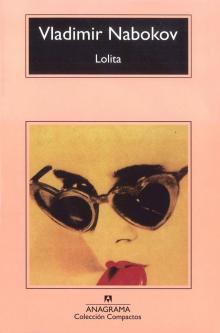 Lolita
Lolita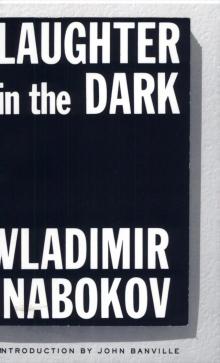 Laughter in the Dark
Laughter in the Dark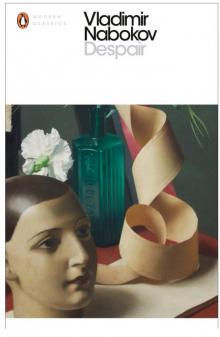 Despair
Despair Mary
Mary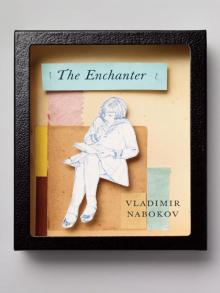 The Enchanter
The Enchanter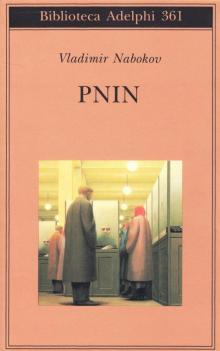 Pnin
Pnin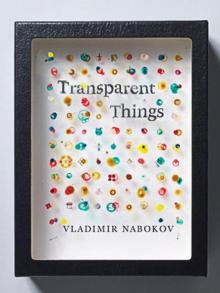 Transparent Things
Transparent Things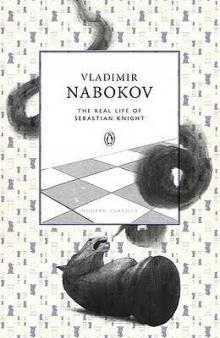 The Real Life of Sebastian Knight
The Real Life of Sebastian Knight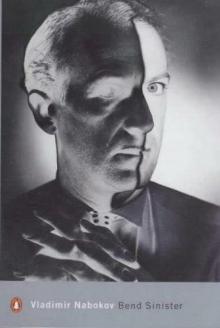 Bend Sinister
Bend Sinister Invitation to a Beheading
Invitation to a Beheading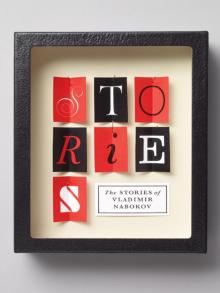 The Stories of Vladimir Nabokov
The Stories of Vladimir Nabokov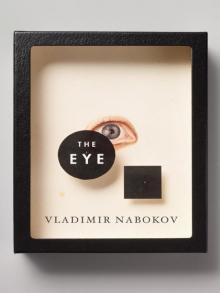 The Eye
The Eye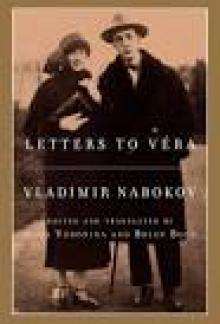 Letters to Véra
Letters to Véra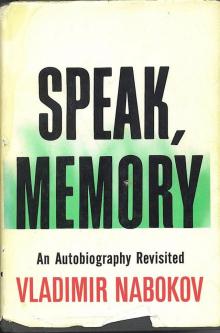 Speak, Memory
Speak, Memory The Gift
The Gift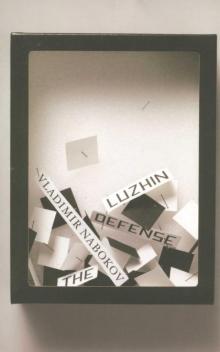 The Luzhin Defense
The Luzhin Defense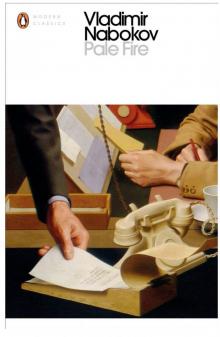 Pale Fire
Pale Fire Glory
Glory Man From the USSR & Other Plays
Man From the USSR & Other Plays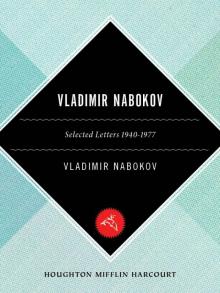 Vladimir Nabokov: Selected Letters 1940-1977
Vladimir Nabokov: Selected Letters 1940-1977 Strong opinions
Strong opinions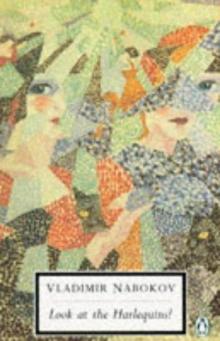 Look at the Harlequins!
Look at the Harlequins!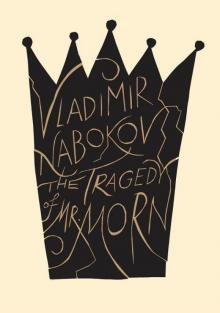 The Tragedy of Mister Morn
The Tragedy of Mister Morn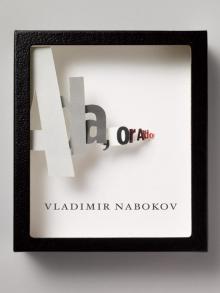 Ada, or Ardor
Ada, or Ardor Lectures on Russian literature
Lectures on Russian literature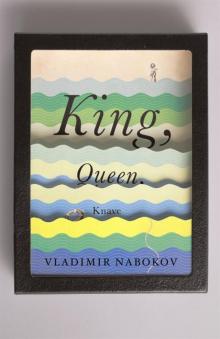 King, Queen, Knave
King, Queen, Knave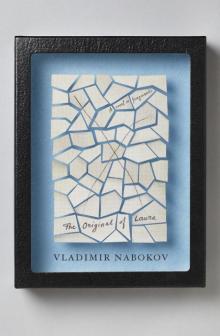 The Original of Laura
The Original of Laura